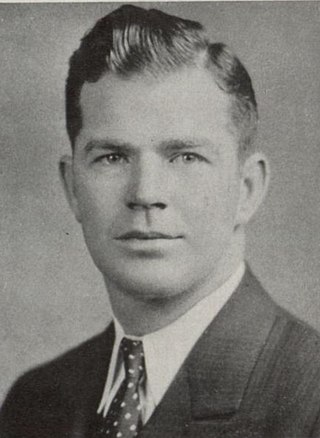
Mack Saxon was an American football and baseball player, coach of football, basketball, baseball, and track, and athletic administrator.

Lucy G. Acosta was a Mexican-American activist with the League of United Latin American Citizens (LULAC). She was a political appointee under various mayors of El Paso, Texas. She was elected to the Texas Women's Hall of Fame in 1987. The Lucy G. Acosta Humanitarian Awards were named in her honor, and have been presented every year since 1993.

Betty Mary Goetting was an American librarian, civic leader and women's rights activist. She is known for bringing Planned Parenthood to El Paso, Texas.

The El Paso Women's Hall of Fame honors and recognizes the accomplishments of El Paso women. It is sponsored by the El Paso Commission for Women and was established in 1985. The first inductees were honored in 1990.
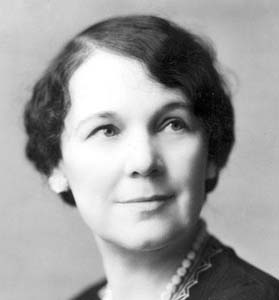
Margaret Bell Houston was an American writer and suffragist who lived in Texas and New York. Houston published over 20 novels, most of them set in Texas. Her work was also published in Good Housekeeping and McCalls in serial format.

Rosa Ramirez Guerrero is a Mexican American educator, artist and historian from El Paso, Texas. She was the founder of the International Folklorico Dance Group. Guerrero has also been active with work in the Catholic Church, and has been called the "Dancing Missionary" in religious circles. She is also known for her multicultural dance programs which have been performed around the country and featured in a film called Tapestry. She was inducted into the Texas Women's Hall of Fame and has an El Paso school named after her.
Betty J. Ligon was an American journalist. She is best known for being the longtime entertainment editor on the El Paso Herald-Post.
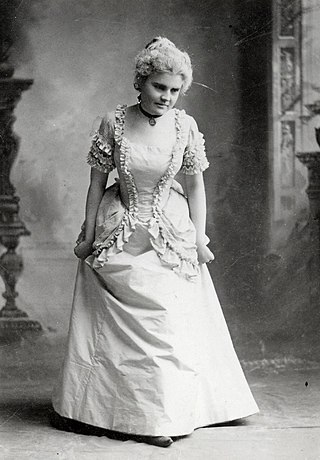
Kate Moore Brown was an American musician, clubwoman and traveler who lived in El Paso, Texas. Brown was one of the first graduates of El Paso High School. She was the first person to teach music in the public schools in Texas and El Paso and was the first woman to own a bicycle in El Paso. Brown is also one of the original creators of the El Paso International Museum which later became the El Paso Museum of Art.

The Hotel Cortez is a historic eleven-story building in El Paso, Texas.
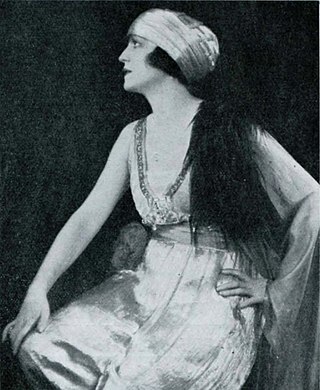
Joan Sawyer, born Bessie Josephine Morrison, was an American society dancer, composer, suffragist, and businesswoman, who performed on the vaudeville circuit in the 1910s. Among her dance partners was a young Rudolph Valentino.
Sandra Rushing is an American women's college basketball coach. She has served as head coach at the University of Texas at El Paso (UTEP), Delta State University, and the University of Central Arkansas (UCA). When she left UTEP, she had the best record for women's basketball in the school's history. Rushing was inducted into the El Paso Women's Hall of Fame in 1999.

Maude E. Craig Sampson Williams was an American suffragist, teacher, civil rights leader, and community activist in El Paso, Texas. In June 1918, she formed the El Paso Negro Woman's Civic and Equal Franchise League and requested membership in the National American Woman Suffrage Association (NAWSA) through the Texas Equal Suffrage Association (TESA), but was denied. Williams organized African-American women to register and vote in the Texas Democratic Party primary in July 1918. She was one of the founders and a charter member of the El Paso chapter of the NAACP, which was the first chapter in the state of Texas. Williams served as the vice president of the El Paso chapter from 1917 to 1924 and remained active in the NAACP until her death. Williams played a significant role in the desegregation of Texas Western College in 1955, which was the first undergraduate college in Texas to be desegregated by a court order other than that of the Supreme Court of the United States. Midwestern University (now known as Midwestern State University was previously ordered to desegregate in 1954 by the SCOTUS immediately following the Brown v. Board of Education ruling.
Myra Carroll Winkler was an American educator and was the first woman to hold elected office in El Paso County.
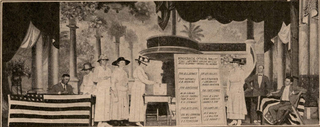
Women's suffrage efforts in Texas began in 1868 at the first Texas Constitutional Convention. In both Constitutional Conventions and subsequent legislative sessions, efforts to provide women the right to vote were introduced, only to be defeated. Early Texas suffragists such as Martha Goodwin Tunstall and Mariana Thompson Folsom worked with national suffrage groups in the 1870s and 1880s. It wasn't until 1893 and the creation of the Texas Equal Rights Association (TERA) by Rebecca Henry Hayes of Galveston that Texas had a statewide women's suffrage organization. Members of TERA lobbied politicians and political party conventions on women's suffrage. Due to an eventual lack of interest and funding, TERA was inactive by 1898. In 1903, women's suffrage organizing was revived by Annette Finnigan and her sisters. These women created the Texas Equal Suffrage Association (TESA) in Houston in 1903. TESA sponsored women's suffrage speakers and testified on women's suffrage in front of the Texas Legislature. In 1908 and 1912, speaking tours by Anna Howard Shaw helped further renew interest in women's suffrage in Texas. TESA grew in size and suffragists organized more public events, including Suffrage Day at the Texas State Fair. By 1915, more and more women in Texas were supporting women's suffrage. The Texas Federation of Women's Clubs officially supported women's suffrage in 1915. Also that year, anti-suffrage opponents started to speak out against women's suffrage and in 1916, organized the Texas Association Opposed to Woman Suffrage (TAOWS). TESA, under the political leadership of Minnie Fisher Cunningham and with the support of Governor William P. Hobby, suffragists began to make further gains in achieving their goals. In 1918, women achieved the right to vote in Texas primary elections. During the registration drive, 386,000 Texas women signed up during a 17-day period. An attempt to modify the Texas Constitution by voter referendum failed in May 1919, but in June 1919, the United States Congress passed the Nineteenth Amendment. Texas became the ninth state and the first Southern state to ratify the Nineteenth Amendment on June 28, 1919. This allowed white women to vote, but African American women still had trouble voting, with many turned away, depending on their communities. In 1923, Texas created white primaries, excluding all Black people from voting in the primary elections. The white primaries were overturned in 1944 and in 1964, Texas's poll tax was abolished. In 1965, the Voting Rights Act was passed, promising that all people in Texas had the right to vote, regardless of race or gender.

Belle Christie Ferguson Critchett was an American social activist and suffragist. Critchett was active in Texas, especially in El Paso and was part of the Texas Equal Suffrage Association (TESA). She worked with suffragist Maude E. Craig Sampson to increase opportunities for Black women voters. Later, she became president of the El Paso chapter of the League of Women Voters.

A. Louise Dietrich was an American nurse, activist and suffragist who was based in El Paso, Texas. Dietrich came to El Paso in 1902 and stayed to help with the typhoid fever epidemic. In El Paso, she started the first nurses' registry in Texas and also created the El Paso Graduate Nurses Association. She worked at several hospitals both in El Paso and in other cities. Dietrich was one of the organizers and founders of St. Mark's Hospital in El Paso. Dietrich was active with the El Paso Equal Franchise League and later became a president of the Texas League of Women Voters (LWV). Dietrich served as secretary in both the Texas Graduate Nurses Association and the Texas Board of Nursing (BON). After Dietrich's death, she was honored by the Texas House of Representatives for her lifetime of work in nursing and other activism.

Zita Moulton, also known as Zita Gordon, was an American model and actress who appeared in theatre and film in the 1920s and 30s. She was featured in fashion photographs throughout the period and performed in Duffy stage productions.

Josephine Day Bennett was an American activist and suffragist from Connecticut. She was a member of the National Women's Party (NWP) and campaigned for women's suffrage outside of the White House, leading to her arrest. Bennett was also involved in other social issues and was supportive of striking workers.















